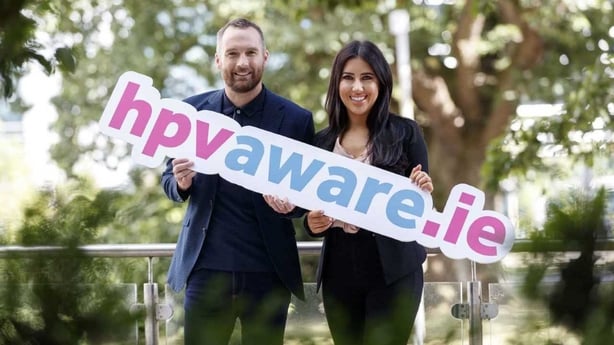We spoke with RTÉ2 presenter Keith Walsh and CEO of the Marie Keating Foundation Liz Yeats about HPV-awareness, ‘back to school’ consent letters and the likely introduction of boys into the national immunisation programme.
Did you know that men and women are at equal risk of HPV? The virus is so common that almost all sexually active people will get it in their lifetime and yet, according to research, two-thirds of us are unaware that men are at equal risk.
In Ireland, all girls are offered HPV vaccinations in their first year of secondary school - this may be attributed to the fact that HPV causes nearly 99% of cases of cervical cancer. However, almost nine in ten men in Ireland don’t realise that they’re likely to get the virus too, and that they are also at serious risk of developing serious cancer if they contract the virus.

We sat down with Keith Walsh to ask why he and his wife decided to get their daughter vaccinated and how he got involved with the HPV-Awareness campaign. Watch the video above.
"I have a daughter - who is now fifteen, almost sixteen - and I remember around the time it came up in school that she was going to get the HPV vaccine, myself and my wife discussed it and there were negative stories in the air around at the time and there were concerns and myself and my wife had to have a chat about it," he said.
"We did look into it and we found out the information about it and we found out everything we needed to know, we went and spoke to our doctor, we spoke to a health professional about it and we decided to have our daughter vaccinated and we're glad we did."
The 2fm presenter says that he got involved with the campaign in order to encourage parents to do their research when it comes to their children's health.
"Don't rely on stories that you heard second hand or something that you read on Facebook - it's not good enough. When you're talking about, possibly, the life of your child - your daughter, your son - you owe [it to] them to find out the facts. That's the only reason I got involved, to get people to go out there and find out the facts."
To understand the medical implications of HPV, we spoke with Liz Yeats, CEO of the Marie Keating Foundation who filled us in on 'back to school' consent letters and the likely introduction of boys into the national immunisation programme.
What is HPV and what cancers can it cause?
Human Papillomavirus (HPV) is a family of very common and highly contagious viruses which are spread through intimate skin to skin contact.
There’s very low awareness and understanding of HPV in Ireland. Almost two-thirds of people don’t realise that males and females are at equal risk of HPV infection. HPV infection usually clears up by itself but if not, it can cause cancers in both men and women such as anal cancer in men and cervical and anal cancers in women.
How common is HPV in Ireland and is there a way to test for it?
Almost everyone who is sexually active will get HPV at some point in their lives. Irish research shows that most (87%) Irish adults don't realise they’re likely to have been exposed to HPV. Most people may never know they have been infected by HPV.
Usually, it clears up by itself. However, a small percentage of people do not clear the infection, which can remain dormant in their bodies, sometimes for many years. HPV vaccination can help to protect against certain types of HPV infection.
Each year in Ireland, up to 420 people will develop cancer caused by an HPV infection. Sadly, up to 130 men and women die each year from cancers caused by HPV.
With regards to testing for HPV, earlier this year the Department of Health announced plans to introduce primary HPV testing in cervical screening.
Is it preventable or is vaccination the only way?
Vaccination can help to prevent HPV infection. The national HPV immunisation programme is the first step in preventing some cancers caused by HPV. In the case of cervical cancer, the second step is through screening. Through both these measures, almost all cervical cancers can be prevented.
With ‘back to school’ consent letters in the post, what do parents need to know about their children getting the vaccination?
The HPV vaccine can help to prevent some cancers caused by HPV, such as anal cancer in men and cervical and anal cancers in women.
The HPV vaccination is offered to girls for free through the National Immunisation Programme to help to protect them against cervical cancer. We recommend website www.hpv.ie. All information contained on HPV.ie has been approved by the World Health Organisation.

Have men been introduced to the national immunisation programme?
The National HPV Immunisation Programme is currently offered to girls only. In July this year, the Health Information and Quality Authority (HIQA) made a preliminary recommendation to extend the vaccination programme to boys as well as girls. The Department of Health is expected to make a decision on this later this year.
Why weren't boys included originally?
It has been known for some time that HPV infection causes about 99% of cases of cervical cancer. So, vaccines were developed to help to prevent HPV infections that can lead to cervical cancer. As a result, when HPV vaccines were made available most countries offered immunisation to girls to help to protect them against cervical cancer later in life.
As scientific research evolved, it became apparent that HPV infection can cause other cancers in men as well as women such as anal cancer. It is also known that immunising more people against HPV will, in turn, reduce HPV infection and decrease rates of HPV diseases in both men and women.
There are now 20 countries worldwide who are offering the vaccine to males and females as part of national immunisation programmes to prevent HPV related diseases.
The Marie Keating Foundation are members of the HPV Vaccination Alliance; a group of organisations that have come together to sign a Contract Against Cancer, specifically, HPV – related cancers.
For more information on HPV please talk to your doctor or visit www.hpvaware.ie

